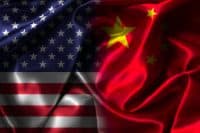 China bashing by U.S. politicians is not akin to warships on alert and bitter arguments over the fate of the relatively small Senkaku Islands, to which China and Japan each lay claim. But the anti-China leaders in America may want to be careful what they ask for, if the reaction in the People’s Republic is anywhere close to the one that caused by the territorial dispute with Japan.
China bashing by U.S. politicians is not akin to warships on alert and bitter arguments over the fate of the relatively small Senkaku Islands, to which China and Japan each lay claim. But the anti-China leaders in America may want to be careful what they ask for, if the reaction in the People’s Republic is anywhere close to the one that caused by the territorial dispute with Japan.
Japan’s exports to China have been rocked. Most prominently, Toyota Motor Corp. (NYSE: TM) and Honda Motor Co. (NYSE: HMC) announced that sales in the world’s largest car market have cratered. Each car manufacturer only recently has begun to recover from the effects of the huge earthquake that hit the nation. It may be that their overall annual profitability is on the line. The territorial dispute between China and Japan could last months or even years.
The U.S. reaction to perceived currency manipulation and dumping of products by China has begun to heat up. American politicians who want to put more pressure on the People’s Republic attacked the Treasury Department for delaying its semiannual report on currency manipulation. The Administration signaled it wanted time to see if China would relent to pressure over the value of the yuan, both diplomatic and economic. That has been tried before — several times — without results. What the Administration will not do officially, the president has done to some extent on the campaign trail. And the Commerce Department will add tariffs to Chinese solar panels, as it did to imported tires less than a year ago.
On the other side of the argument about how to contain China’s perceived economic aggression is presidential candidate Mitt Romney. He believes he can gain points with voters by claiming that the People’s Republic has taken millions of U.S. manufacturing jobs. He will not admit that most of those jobs were exported because American companies wanted better margins. As a businessman, he should know as well as anyone else what the catalysts of job migration are.
China’s consumers and its business have not done much in reaction to what could be perceived as economic aggression by the United States. But that could change. There has been a recent uproar in Washington over whether Chinese telecom components suppliers Huawei Technologies and ZTE have used their presence in the U.S. to spy on American infrastructure plans. The Chinese government’s reaction was harsh, and it said that “bashing” was at the heart of the complaints.
There was a tipping point, particularly among Chinese consumers, when they believed that Japan’s territorial claims were a sort of aggression. Some took to the streets and tipped over Japanese-made cars. That could happen to Cadillacs if the U.S. presses trade claims enough to threaten China factory jobs and injures the pride of the country’s citizens.
Investors only have to look at the P&Ls of American companies like McDonald’s Corp. (NYSE: MCD), General Motors Co. (NYSE: GM) and Wal-Mart Stores Inc. (NYSE: WMT) to see how much large U.S. corporations have at risk in China. And that does not include the thousands of smaller American firms that export goods and services there, as well.
Douglas A. McIntyre
In 20 Years, I Haven’t Seen A Cash Back Card This Good
After two decades of reviewing financial products I haven’t seen anything like this. Credit card companies are at war, handing out free rewards and benefits to win the best customers.
A good cash back card can be worth thousands of dollars a year in free money, not to mention other perks like travel, insurance, and access to fancy lounges.
Our top pick today pays up to 5% cash back, a $200 bonus on top, and $0 annual fee. Click here to apply before they stop offering rewards this generous.
Flywheel Publishing has partnered with CardRatings for our coverage of credit card products. Flywheel Publishing and CardRatings may receive a commission from card issuers.
Thank you for reading! Have some feedback for us?
Contact the 24/7 Wall St. editorial team.





